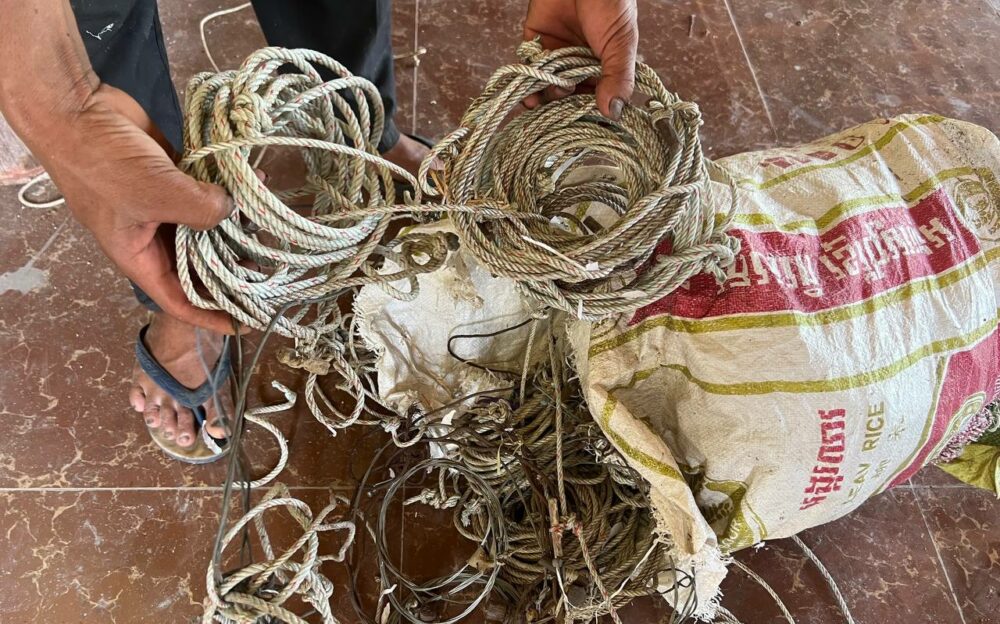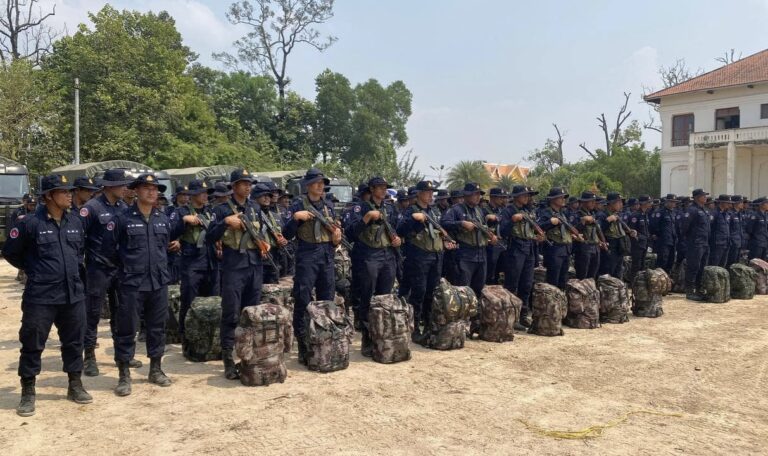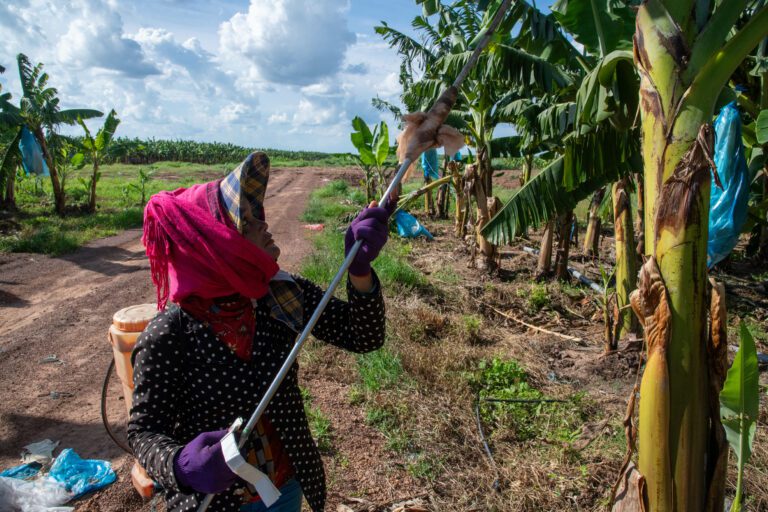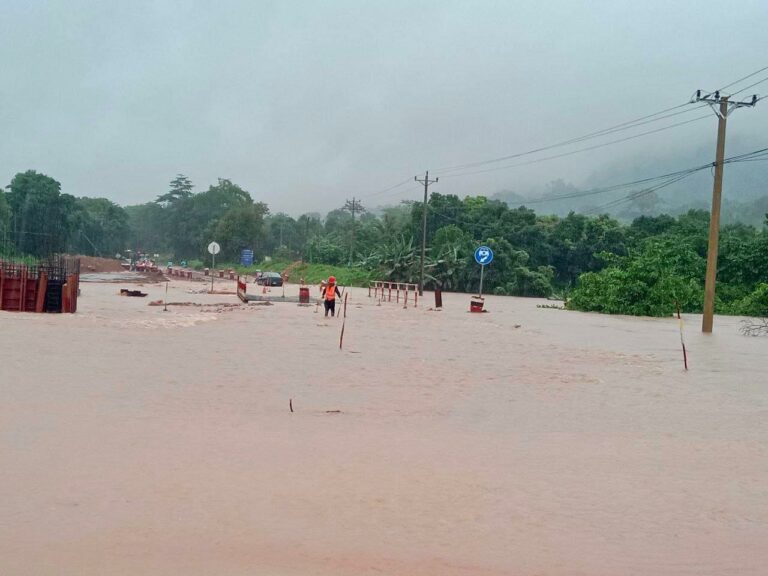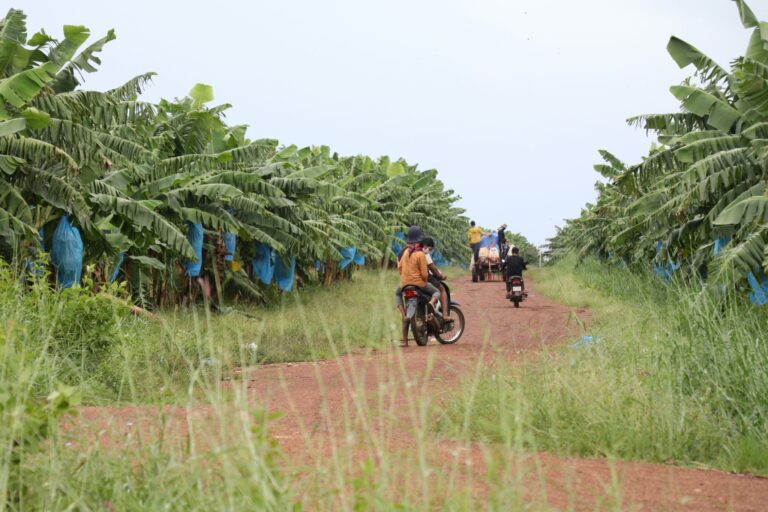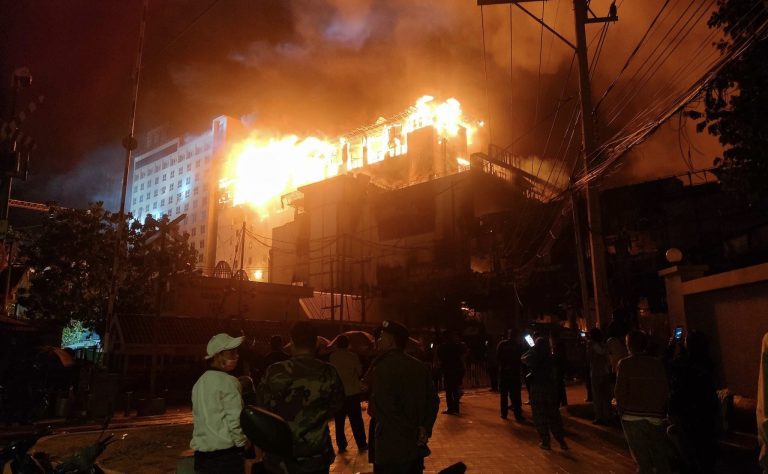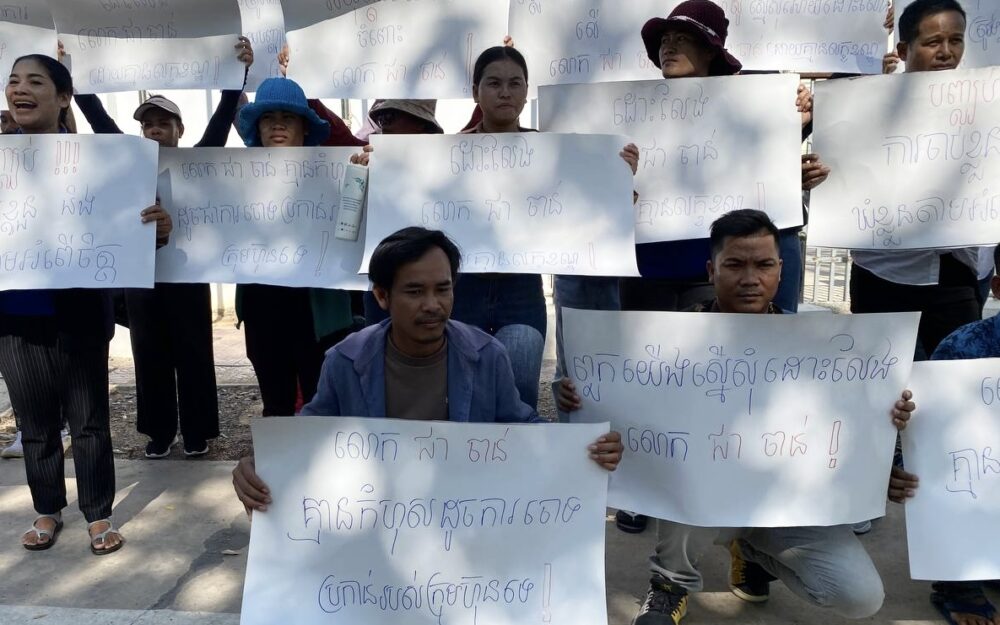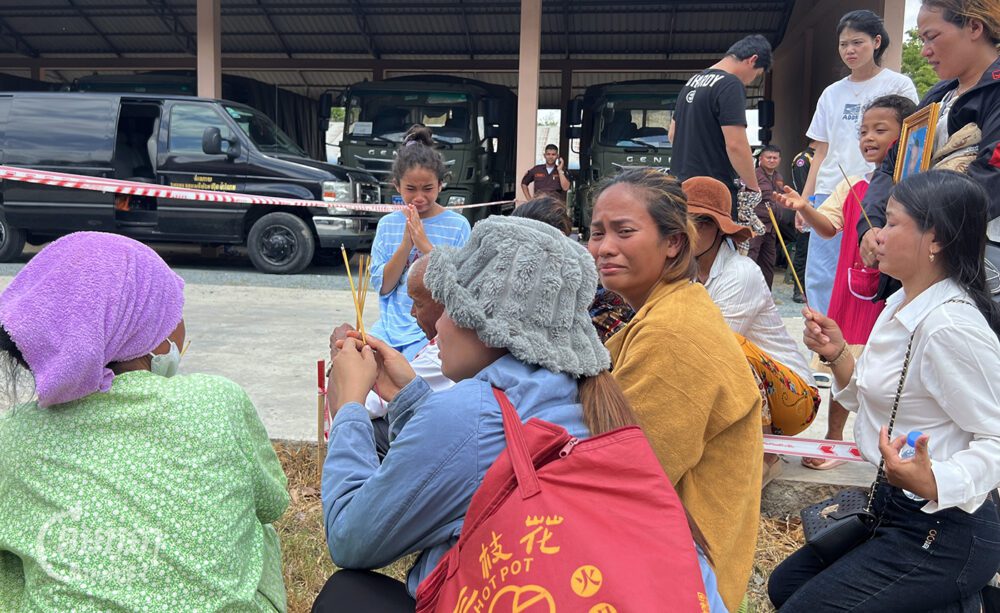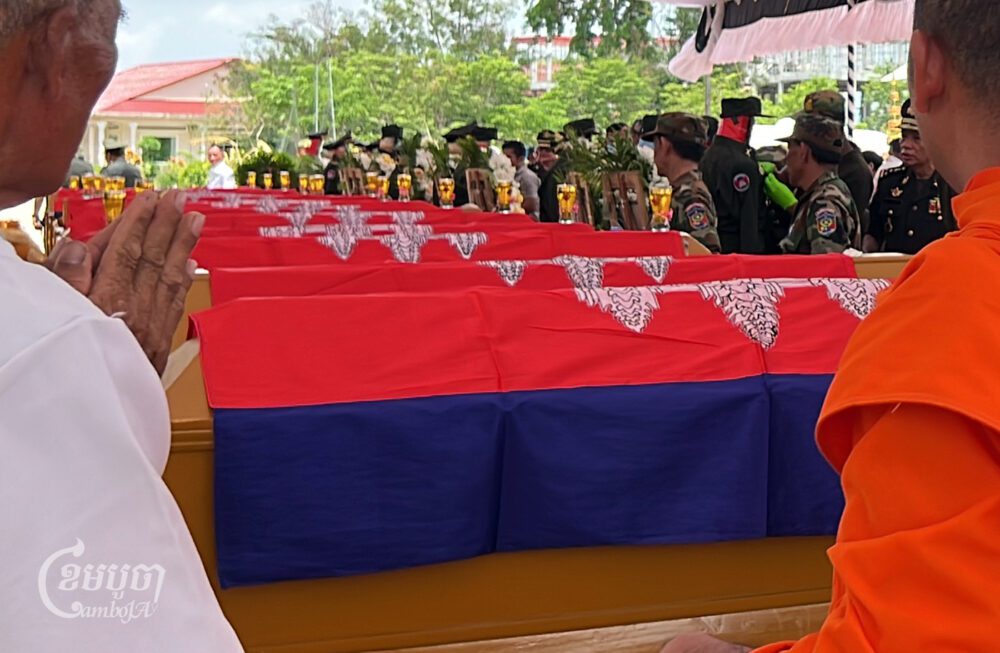It’s been nearly two years since Cambodia implemented a zero-snaring strategy to end the centuries-old practice of brutal and indiscriminate wildlife capture and death.
“This is the strong commitment of all of us to eliminate all kinds of traps in Cambodian protected areas and to stop illegal wildlife,” remarked Net Pheaktra, the Former Secretary of State to Ministry of Environment and Chairman of the Zero-Snaring campaign, on March 3, 2022, and he is now the minister of Ministry of Information- the country’s first day commencing on this trip, which coincides with World Wildlife Day.
The Ministry soon issued a public release stating that the programs had so far been successful.
The campaign promises to cooperate with local authorities and communities to prevent crime and educate people about the law and the significance of wildlife.
Snaring might result in one to five years in prison and a fine ranging from fifteen million to one hundred fifty million riels.
It is now in its second year. The zero-snaring effort has spread across 12 national forests and wildlife sanctuaries.
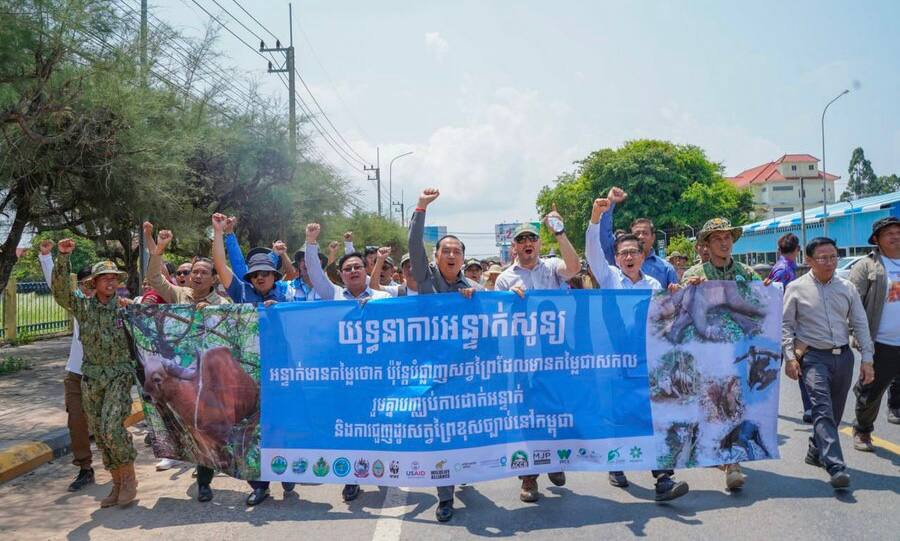
Long way to go.
The Monks Community Forest (MCF) is a conservation project located in Oddar Meanchey province, along the border with Thailand.
This community-based program, founded in 2000, was established by a group of devout monks determined to protect the enormous 18,261-hectare forest from the gradual spread of illegal logging and other activities.
Venerable Tho Thoross, a 37-year-old monk who serves as MCF’s second chairman, is at the heart of this great endeavor. He proclaims, ”Monks are the stewards of leadership across generations.”
There are 13 settlements in the province of Oddar Meanchey, including the prestigious MCF. Regrettably, some of these villages have become nothing more than namesakes. ”They remain only in name,” Venerable Thoross says, ”their once-vibrant existence transformed into cassava plantations.”
He says preserving an 18,261-hectare communal forest is a cornerstone of MCF and similar efforts. ”About 99.99% of our community land remains under our vigilant guardianship,” he said. “Personal plantations have taken less than 1% of the land.”
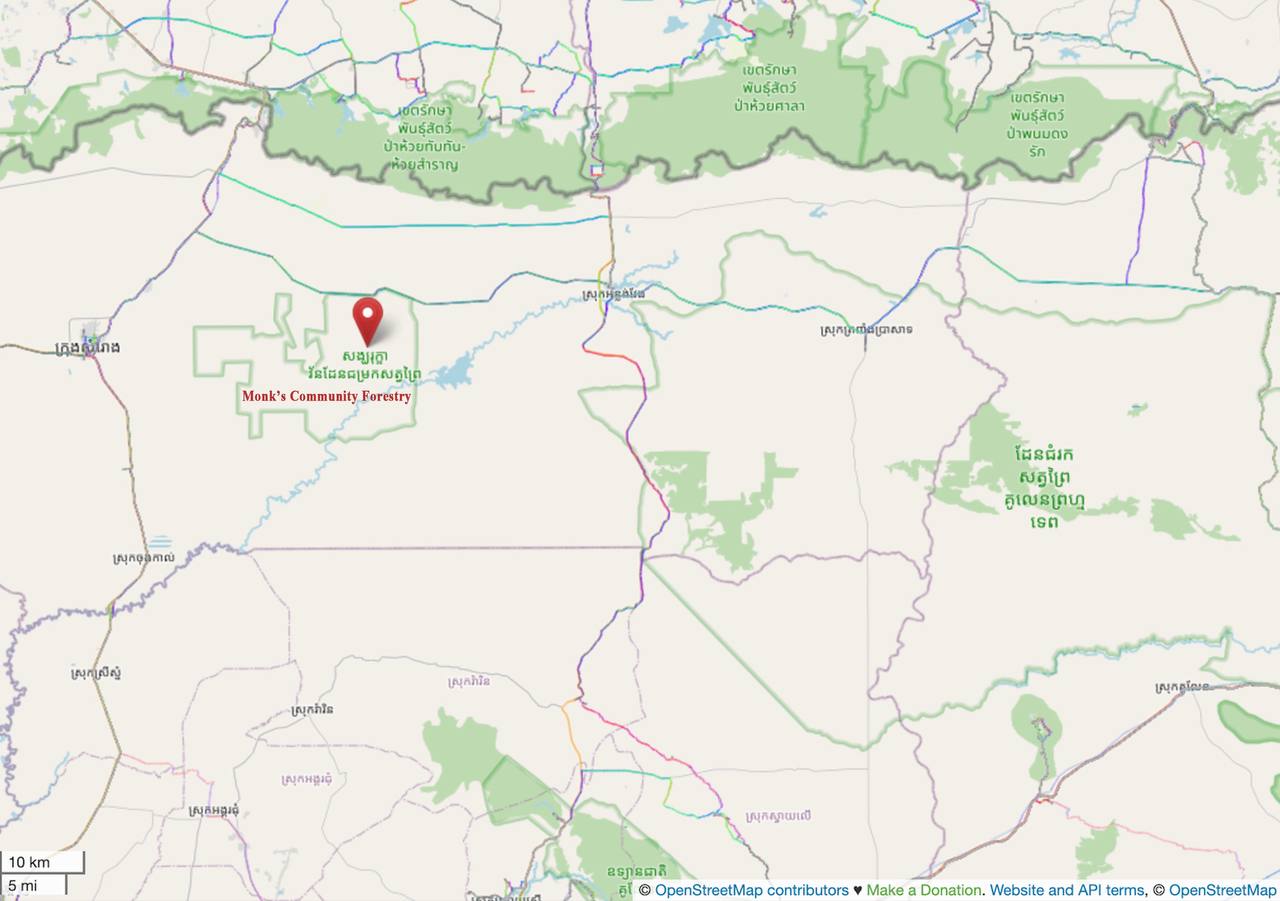
The Guardians’ Story:
In the years that followed, people saw monks solemnly wrapping their robes around trees to demarcate the boundaries of the forest sanctuary, signifying their vow to protect this natural treasure.
These monks and the villagers found the guardian team, embarked on weekly patrols, each contingent comprising 20 to 30 individuals. The forest was so remote that not even vehicles could breach its depths.
Venerable Thoross reflects on those challenging times: ”We trekked an arduous 30 kilometers, solely on foot.”
They relied on the monks’ robes to chart the way as they navigated these treacherous terrains without the comfort of GPS. Each robe solemnly declared that the woodland was under the monks’ care.
MCF is committed to the protection of trees, wildlife, and biodiversity. They establish patrol teams of 8 to 20 people to travel over these lush plains four times a week.
“This is a routine that we execute unwaveringly,” Venerable Thoross says of their dedication.” Regarding hunting, we will not allow any species to be harmed.”
But the truth is challenging. As the dry season envelopes, the land from February to March, illegal hunting of monkeys proliferates. The once-teeming rhesus macaques numbered around 1,000, have dwindled significantly. A distressing sight of fewer than one hundred of these primates remains. Traps and rice baits pose ominous threats to the diminishing their populations. Report says they become lucrative merchandise across the border.
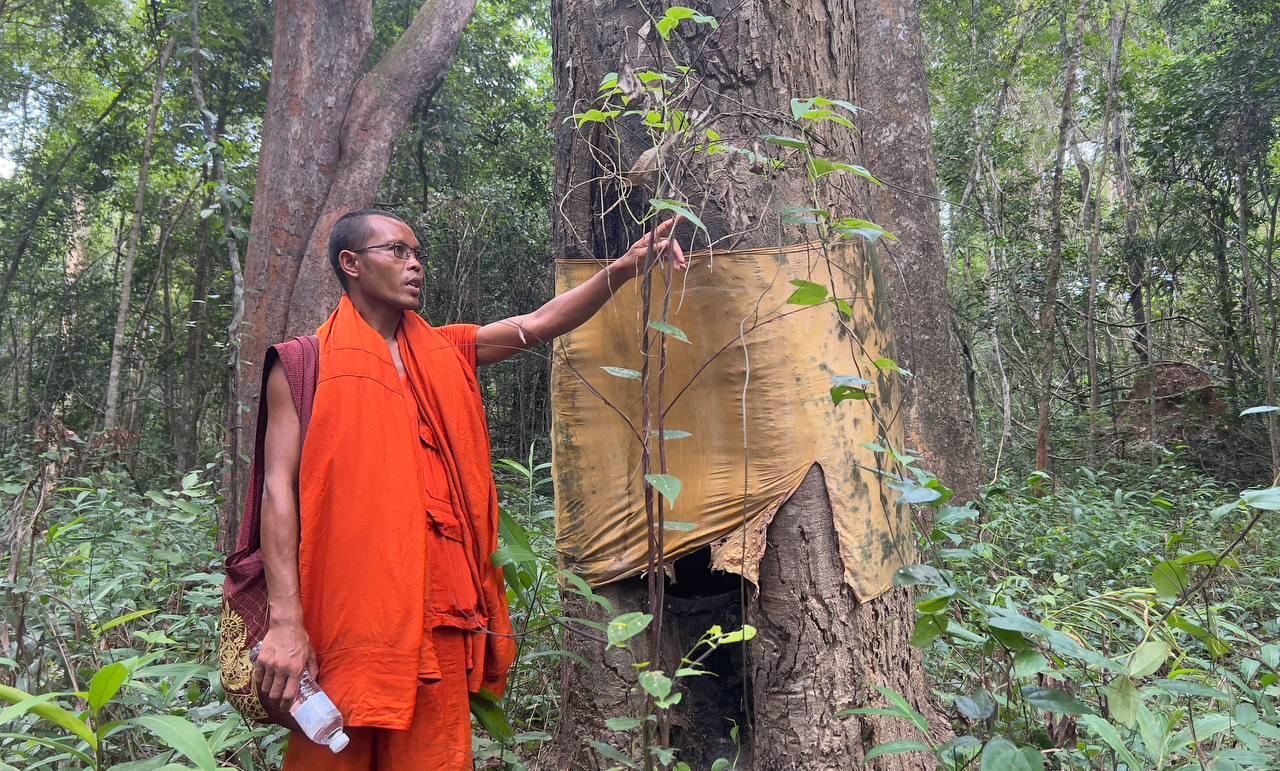
Uncomfortable truth:
According to the 2020 WWF report, over twelve million snares are installed each year throughout protected areas in Cambodia, the Lao People’s Democratic Republic (PDR), and Vietnam, a group of countries at the epicenter of the region’s snaring epidemic.
Also on record, the giant muntjacs of Cambodia and the northern yellow-cheeked crested gibbon are among the most endangered species in the region because of the snare crisis.
Meanwhile, a joint study by the Ministry of Environment and WWF Cambodia revealed concerning figures. Between 2010 and 2022, the population of bantengs fell by 89%, bull populations declined by 65%, and wild boar populations fell by 15%, according to the Ministry of Environment’s official Facebook page.
Though formerly common in the MCF, mature bantengs are now uncommon to see, and the forest has become dangerous for these gorgeous beasts.
From 2020 to 2023, adult, brown-skinned bantengs vanished from the cameras that formerly documented their noble presence. This unsettling reality foreshadows the coming disaster.
Due to excessive poaching and snaring in the region, monkeys, deer, and bantengs are on the verge of extinction. Snares and electric wires are standard, with electric lines reaching startling lengths of hundreds of meters and powered by expensive batteries and motors. The electric shocks delivered by these wires are fatal, leaving any creatures that survive crippled.
“Almost all banteng are scars,” explained Venerable Thoross. The slaughter continues, as evidenced by a recent patrol discovery of a banteng with a shattered leg caught in a trap.
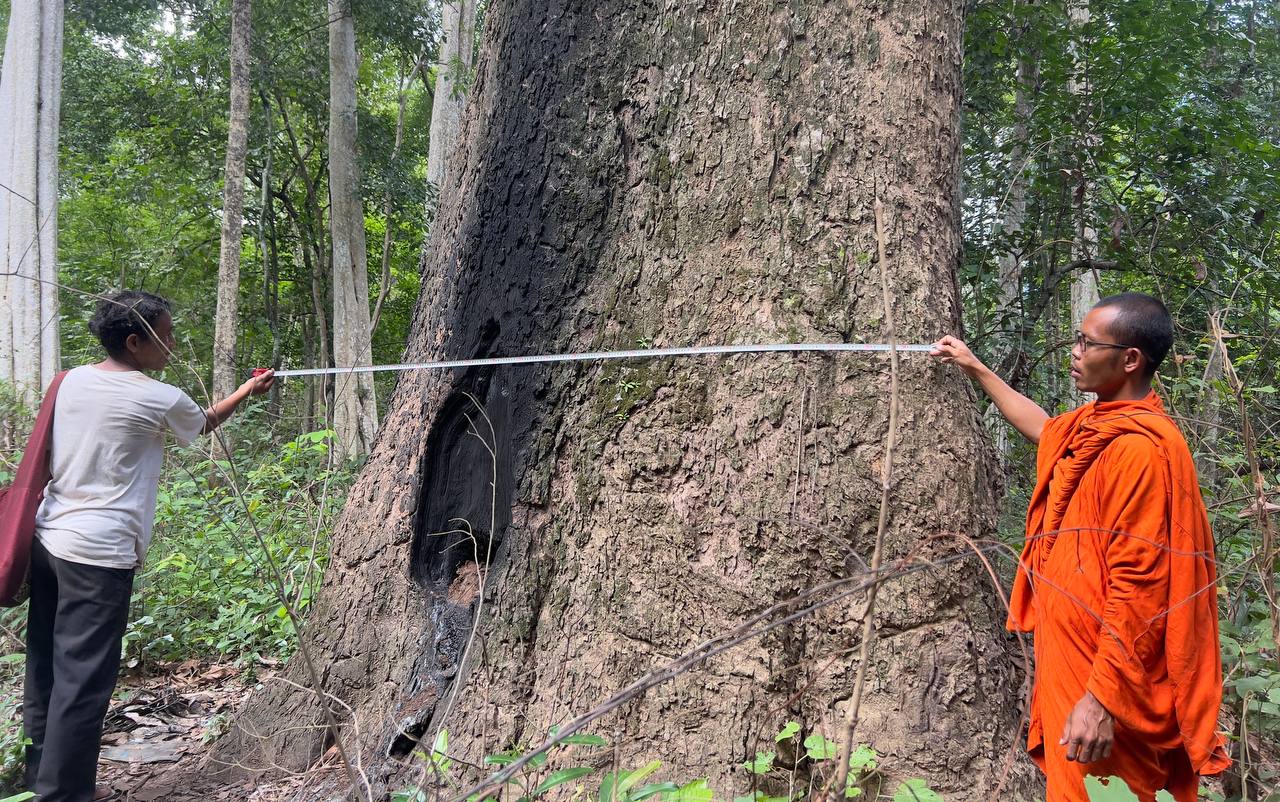
The lone guardian.
While the community is unshakable in its conservation commitment, it needs a budget to continue these efforts. Patrolling alone necessitates substantial financial resources to pay expenses such as meals for patrol teams, gasoline and diesel to power vehicles and machines, and facilitating the transportation of alleged perpetrators to law enforcement authorities.
“Money that we have spent recently is from philanthropists who love natural resources,” he said.
Previously, the community received grants from the United Nations Development Programme (UNDP) and the Ministry of Environment to support patrolling and measuring efforts.
“But there has been nothing since 2021. There’s no help from the Ministry. In a nutshell, we live and breathe by ourselves every day,” he said.
The need for more assistance from the Ministry raises questions regarding the fact that MCF has earned global recognition, clinching the prestigious Equator Prize.
The Minister of Environment, Eang Sophalleth, could not be reached for comment.
According to Article 32 of the law on protected areas, the government shall establish a “protected areas fund” to manage the protected area through a joint committee led by the Ministers of Environment and Economy and Finance.
Meas Soksensan, a Ministry of Economics and Finance spokesman, requested that the journalist question the Ministry of Environment about the national budget on this.
Phuong Lina, the Director of the Oddar Meanchey Provincial Department of Environment, clarifies that the Zero-Snaring Campaign, while active in other regions, has yet to reach Oddar Meanchey.
He agrees that the province deserves to have one because there is a wildlife sanctuary, the MCF.
The department’s limited budget prevents direct assistance to the community. So, Phuong Lina hopes NGOs and partners will fill the void.
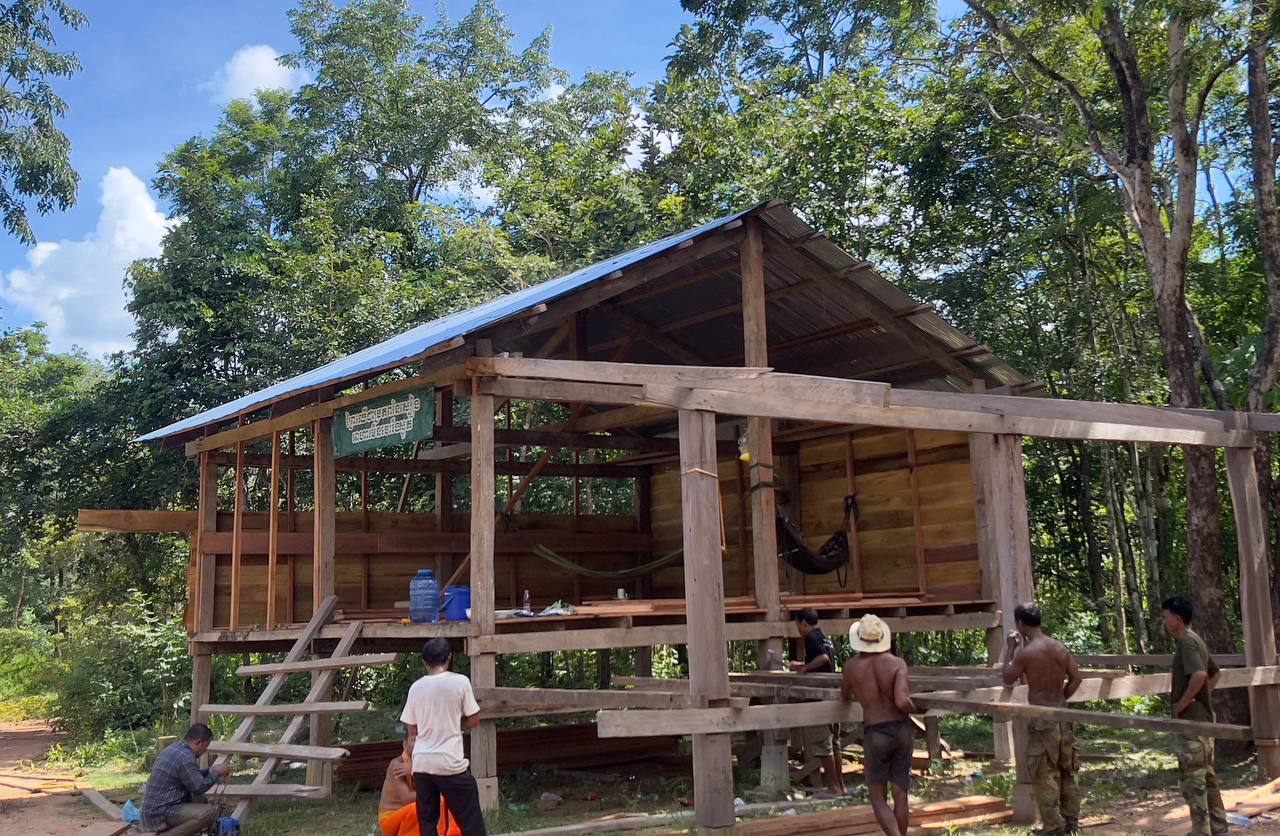
What is to come?
Heng Kimhong, a program manager at the Cambodian Youth Network (CYN), articulates the pressing issue of natural resource crimes, which continue to ravage the region. Deforestation, land encroachment, and hunting in protected areas cast a looming shadow over these vital ecosystems.
“It simply occurs over our grave concern,” Kimhong said.
Within the ambit of conservation, the communities find themselves wrestling with the relentless specter of wildlife hunting. As Venerable Thoross underscores, this presents a formidable challenge, a concern that gnaws at the heart of their efforts.
“Without urgent measures,” he warns, ”the next 15 years may witness the irrevocable loss of these pristine ecosystems if the current pace of inaction persists.”
Budget constraints loom as a recurrent impediment. The sheer costs of patrolling, law enforcement, and Community maintenance weighs heavily on their shoulders. The absence of financial support raises existential concerns.
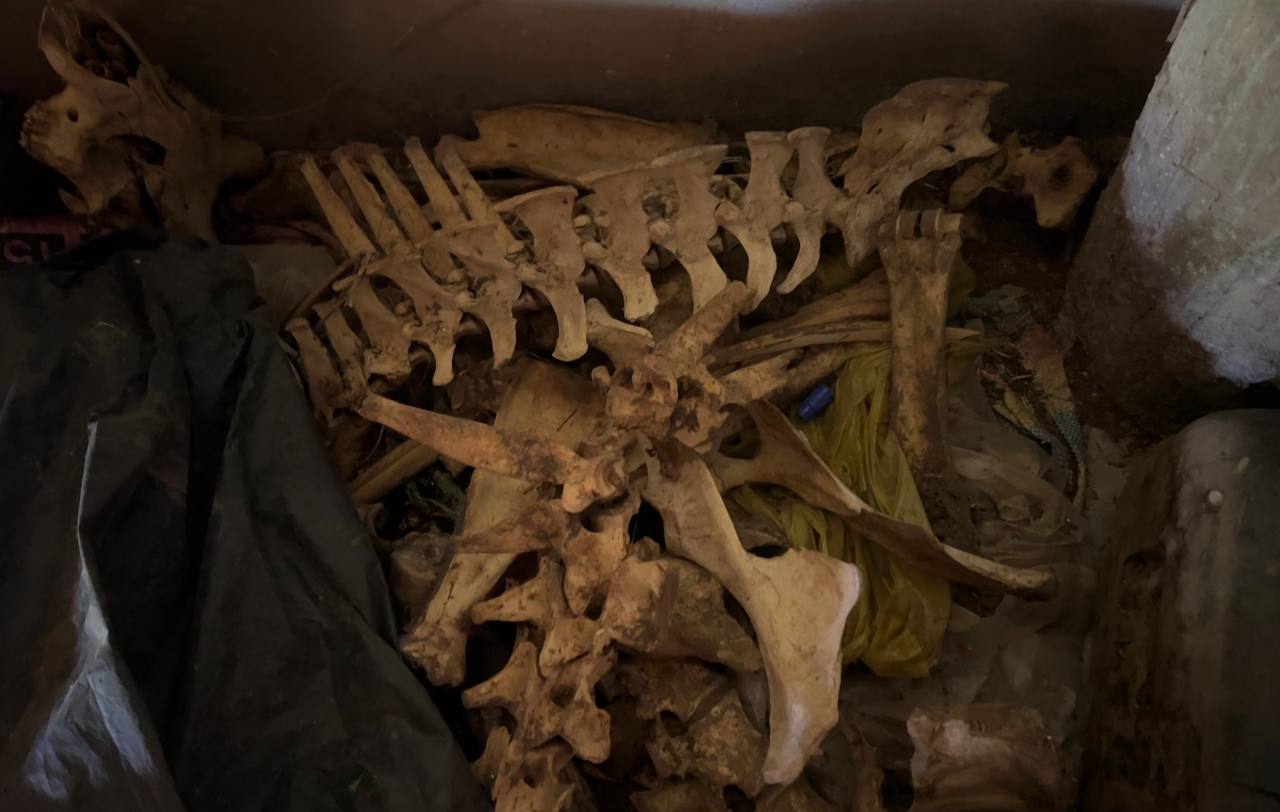
Towards sustainable live:
Despite the daunting challenges, Venerable Thoross holds a vision for community development. Plans are afoot to construct a bridge within the forest and carve out camping sites in ravines. This ambitious endeavor is designed to generate income, breathing life into the community’s economic prospects. He reflects, ”We have learned to be self-sufficient, especially during the difficult period from 2019 to 2022 under the pandemic.”
Income from ecotourism, he envisions, can provide the much-needed financial resources to invest in community development, meet essential needs, and create employment opportunities. MCF seeks to stimulate job creation through agricultural endeavors, cultivating crops like pineapples, Chinese ginger, and galanga within the community forest.
“I want to create jobs for people surrounding the forest, enabling them to secure a steady income while diminishing the prevalence of forest crimes.” Venerable Thoross passionately affirms.
Sav Ith, another resolute conservationist, serves as the community director of the Ou Tong Natural Resources Protection initiative in Vuen Sai district of Ratanakiri province. He, too, believes that the government should steer these communities toward ecotourism. Emphasizing the benefits of refraining from wildlife hunting and embracing the economic potential of tourism.
He has patiently awaited patrolling materials and uniforms from the Ministry of Environment for two years, a promise yet to materialize.
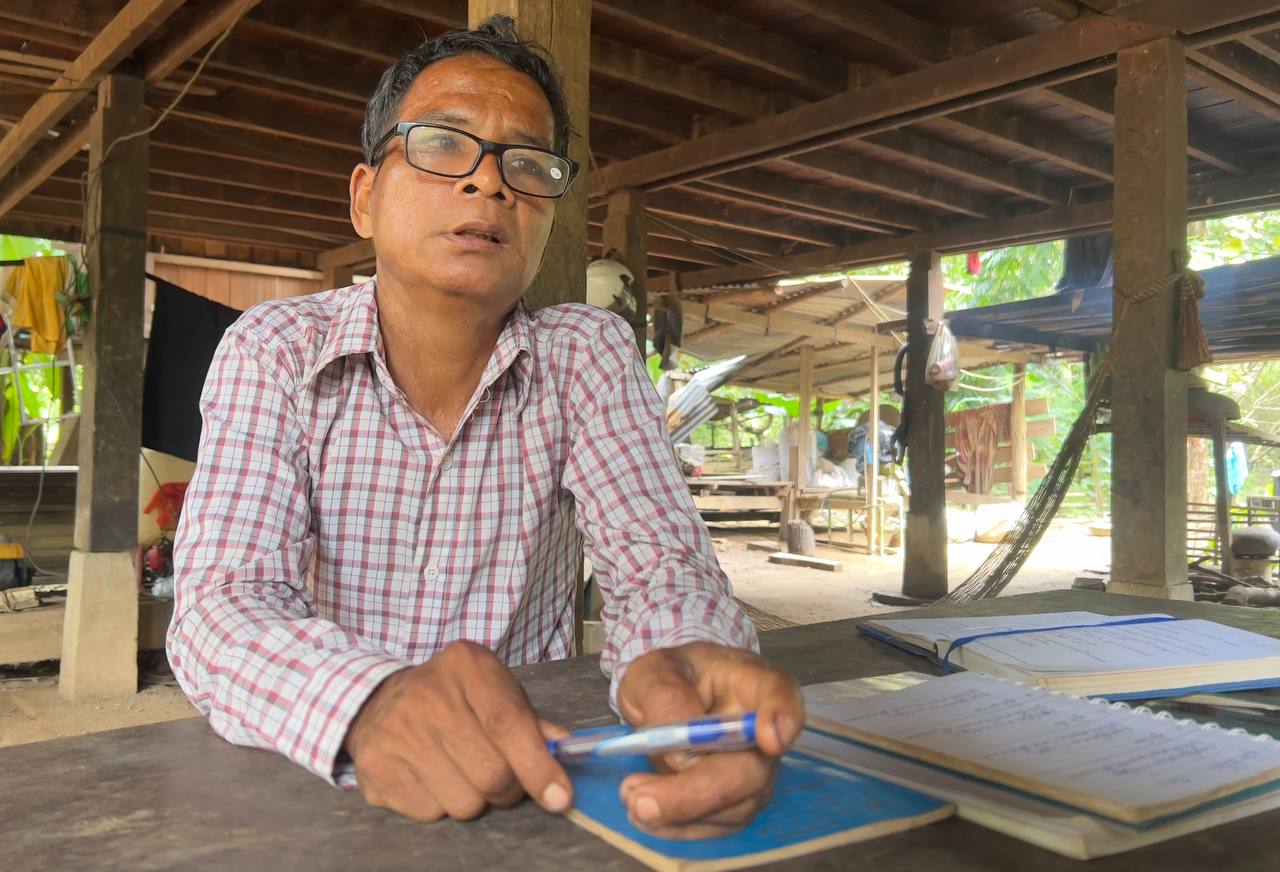
How does the zero-snaring go?
The Zero-Snaring Campaign, a commendable initiative, promises to curb the pervasive threat of snares and wildlife trafficking.
Remarkably, by 2022, the campaign had successfully removed over 34,000 traps from protected areas in Cambodia. It signifies a 44% reduction in trap prevalence compared to the previous year, a remarkable feat. Nevertheless, the precise number of traps infiltrating protected areas annually remains an enigma.
Snares spare no species, ensnaring creatures from turtles to elephants, vultures to birds, posing a universal threat. In prior studies, only 20% of traps have been eliminated annually.
Kimhong extends his wholehearted support to the campaign while underscoring the essential need for stringent law enforcement.
The government must grant local communities the autonomy and freedom to protect their natural resources, dispelling fears of legal consequences. Kimhong said.
“Public participation, as provided in Articles 21 and 29 of the Law on Protected Areas should be widely encouraged to participate and protect their natural resources.”
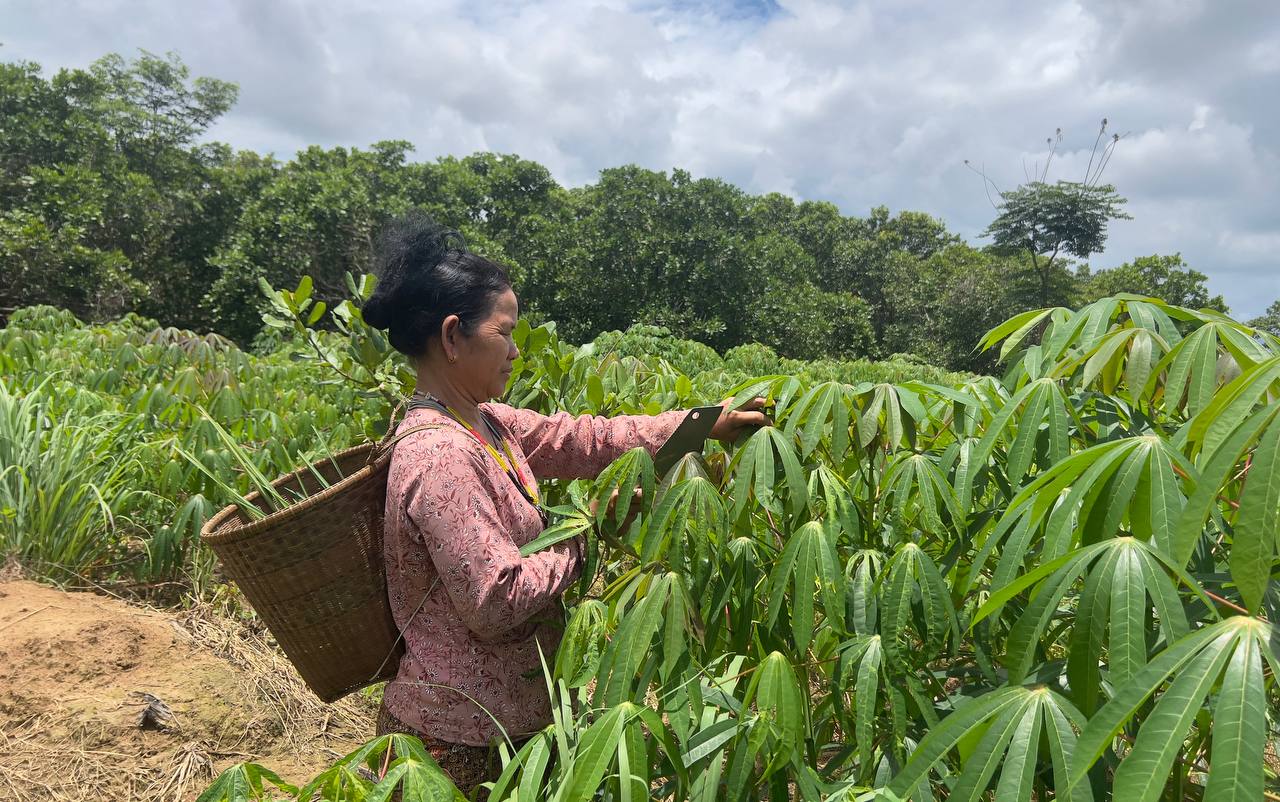
Fast and Fair:
Venerable Thoross echoes the efficacy of law enforcement and public awareness campaigns, essential to the broader conservation movement. These endeavors can deter potential criminals, inspiring some villagers to surrender their snare and their weapons.
He passionately insists on the critical importance of community, and as such, he makes an emotive plea to the local community to stop inadvertently being harmful to ecosystems.
Moreover, he urged the government and the relevant authorities to ensure law enforcement fairly and comprehensively.
“The only thing we need from you is, please be unwavering in enforcing the law.”
Ten hours away, in Vuen Sai district, Ratanakiri province, on the Vietnamese border. The Kavet ethnic group who call this place home have their concerns. For years, there has been a fall in wildlife.
Chhiv Yim, 48, wants to join her village patrol to prevent additional casualties. But she can’t because of the injury to her left eye.
“What I can do is just sleep with my never- faded concern.”
“Reporting for this story was supported by Internews’ Earth Journalism Network”.


